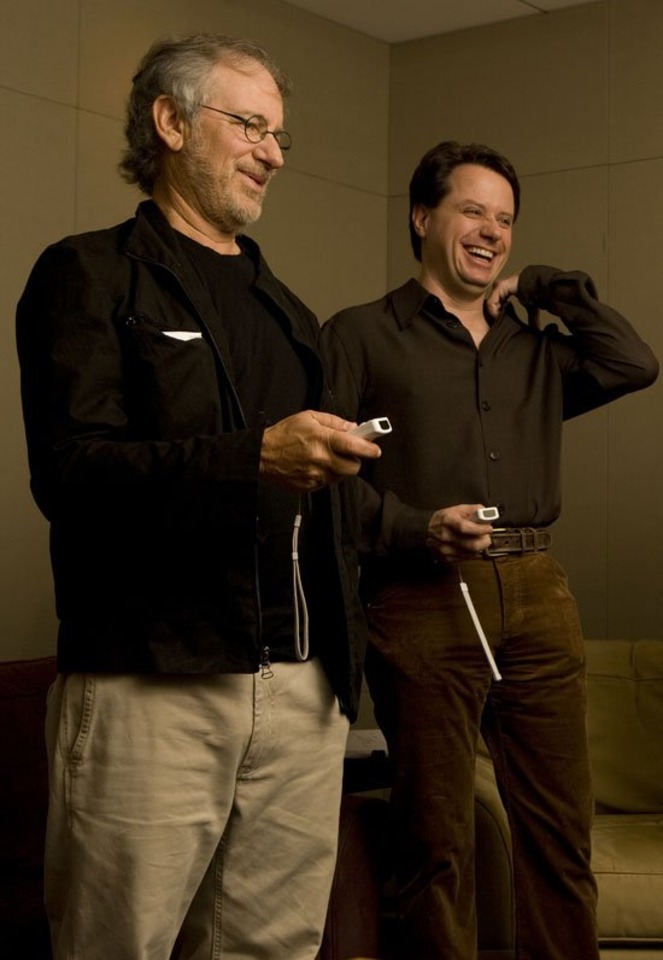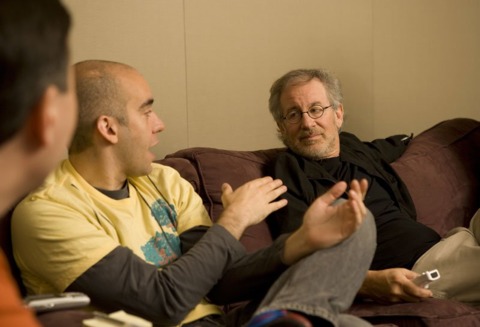E3 '07 Q&A: EALA on Spielberg's PQRS, LMNO
Studio chief Neil Young talks about collaborating with the famed filmmaker on his two upcoming Wii and 360/PS3 games.
SANTA MONICA, Calif.--This week, Electronic Arts revealed it was working with famed filmmaker Steven Spielberg on two projects: A Wii puzzle game code-named "PQRS," and "LMNO," an action-adventure game for the PlayStation 3 and Xbox 360. The collaborations mark Spielberg's return to gaming eight years after he sold DreamWorks Interactive, the fledgling arm of movie studio DreamWorks SKG, which was itself sold to Viacom in 2005.

After being bought by EA, DreamWorks Interactive was rechristened EA Los Angeles, and has developed such games as the Command & Conquer 3 and Medal of Honor series. In late 2005, EA and Spielberg inked a deal to develop three next-gen games at EALA under the director's supervision. To find out about the first two projects coming out of the agreement, GameSpot caught up with Neil Young, EALA's general manager and vice president.
GameSpot: So let's start with the Wii game, code-named "PQRS." How long have you been developing that?
Neil Young: Well, we started development of it after E3 of last year. Do you remember those images of E3 of last year of Steven playing Wii Sports with Mr. Miyamoto? Well, basically it happened just after that photo. We were walking down the steps from the Nintendo Wii booth, and Steven literally said, "That machine is awesome, I want to make something for that, and I have this idea." So a week or so later, we sat down and started brainstorming around ideas.
GS: So what's the extent of his involvement now?
NY: He comes into the studio most weeks and works on that project with [EALA vice president] Louis Castle and myself. Then he works on the other project with [LMNO producer] Doug Church and myself. He's very directly involved.
GS: So how will the use of the Wii Remote in PQRS differ from other puzzle games?
NY: Basically, the game is centered around blocks, and there's sort of an underlying physics simulation that's running on the machine. It's a sort of realistic physics which allows for making structures based on the blocks. So now imagine being able to interact with those blocks with the remote, as sort of classic building block. Now apply video game-ness to that: Some blocks explode, some have point values, some vanish, some turn into creatures, some combine after a chemical reaction happens. So you've got the basis for a very very interesting parlor game that can run from one end of the spectrum--something that feels like Jenga--to the other end of the spectrum: a complex psychics machine that resembles a Rube Goldberg machine.
On top of that, we've introduced characters which can animate and move and have vestigial social behavior animated with them. And that can create interesting situations--be it solving the puzzle, or keeping the structure intact. You can play single-player and you can play cooperatively. There's a little editor which allows you to take all the blocks and characters in the game and create your own game.
GS: So you can create your own characters? Will that be via the Mii functionality?
NY: Well, you can't create your own characters, but you can use the characters we created in the software. And you'll be able to create your own levels.
GS: That sounds very fascinating. Do we have a release window for PQRS at this time?
NY: The only thing that we've said is that we'll release the game during [EA's] current fiscal year, and our fiscal year ends at the end of March [2008]. It's exclusive to the Wii, and we're going to demo it at our press conference at E3.

GS: So tell us about LMNO, the PlayStation 3 and Xbox 360 game you've been working on.
NY: OK, well, just to clarify, that's a code name.
GS: Yeah, I can't believe people thought that was real.
NY: Yeah, the story there is every time we came up with a code name at EA, people ask what it meant. They'd speculate that it meant that or this or that, so we just picked the middle four letters of the alphabet to prevent that. Then, when the next game came along, it was easy--we just picked the next four letters.
GS: So you said that you started development on LMNO first. When did that start?
NY: It started around 15 months ago.
GS: So how is this going to differ from other spy action games? It has some pretty familiar elements in it.
NY: Well, the real focus in the game is between the player and the non-player "partner." It's an action-adventure game that is set against the backdrop of a contemporary, epic story. It will show world-changing events through the eyes of a series of a very small number of people who are intimately connected. And that's really the profile of a lot of Steven's films. So that actually is a perfect construct for us to explore how we move people emotionally in games, and that's really the kind of challenge that we're going after.
But what we're thinking about is the non-player character is more of a peer. That will add a new level of complexity to the puzzles in the game. We think that's a very important relationship level to reach to connect emotionally to the character.
GS: Now you mention the "relationship" with the female character in LMNO. I've heard that her abilities will change as depending how the player treats her. That's led some people to refer to this as the "high-maintenance girlfriend game."
NY: [Laughs] No, no. It's not like having a high-maintenance girlfriend in the game. It's having a really capable partner. The things you experience in the game, both the way you play and the way it plays out, are extremely dependent on her.
GS: Now these games sound really interesting. But just early this week, EA CEO John Riccitello said that the game industry is "boring people to death" by pumping out boring sequels that just dilute franchises. However, he also said the industry is alienating the mainstream players by "making games that are harder and harder to play." Now if that's the sentiment of the head of your company, how will these games strike a balance between interesting without being overly complex?
NY: Well I think that John was throwing down a gauntlet to the industry and stating a position inside the company that we need to make fresh and accessible games. For core gamers, I think we have a responsibility to underline and double-bold the word "fresh" and not be imitative. For older audiences, I think we need to think about building something that's accessible. I think these two products are perfect examples of both.
Got a news tip or want to contact us directly? Email news@gamespot.com
Join the conversation